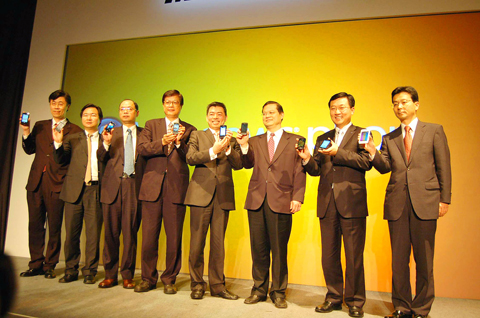Microsoft Corp unveiled its Windows Mobile 6.5 yesterday in Taiwan, with local handset makers and telecoms operators backing the latest smartphone operating software.
“In the past, Windows Mobile gave the impression that it was an operating software for business users. But we want to change that and show the software is for both consumers and business users,” Davis Tsai (蔡恩全), Microsoft Taiwan general manager, told a press conference.
With the rollout of Windows Mobile 6.5, Microsoft is gearing up to reach out to more smartphone users because smartphones are set to drive the future growth of the mobile phone industry. Competition in the smartphone space has heated up with Apple Inc’s iPhone and Google Inc’s Android gaining popularity among general users.

PHOTO: WANG PEI-HUA, TAIPEI TIMES
Management from local handset makers, such as Acer Inc (宏碁), HTC Corp (宏達電), Asustek Computer Inc (華碩電腦), as well as telecoms operators such as Chunghwa Telecom Co (中華電信), were at yesterday’s event in a show of support for the new software.
Acer is set to launch three models of Windows Mobile 6.5-based smartphones in Taiwan by December, while HTC will roll out two models and Asustek one.
Smartphones running on Windows Mobile 6.5 will feature a redesigned Web browser and a free service called “My Phone,” which allows users to back up contacts, messages and photos on a computer or the Internet.
An online applications store — Windows Marketplace for Mobile — was launched alongside Windows Mobile 6.5. Windows Marketplace is similar to Apple’s popular App Store for iPhone or Research in Motion’s recently unveiled Blackberry App World.
Microsoft Taiwan said there are around 300 English applications available for download for free or for a fee in Windows Marketplace. More than 200 Chinese applications will go “live” next month.
“Localized mobile applications are the way to spur demand for smartphones and the operating software,” said Shih Mu-piao (石木標), spokesman of Chunghwa Telecom, which has sold 300,000 smartphones running on Windows Mobile to date.
Local content providers have been quick to tap such growth by introducing applications catering to the Windows Marketplace, but they are not missing out on other software such as Android.
Soyong Corp (曉騰國際), for instance, will work out applications for its English-Mandarin dictionary or English-based learning materials for both Windows Mobile and Android platforms.
“The business potential of these online applications stores is huge and we want to reach out to as many users as possible,” sales director Derrick Tan (譚建祥) said.

Taiwanese suppliers to Taiwan Semiconductor Manufacturing Co. (TSMC, 台積電) are expected to follow the contract chipmaker’s step to invest in the US, but their relocation may be seven to eight years away, Minister of Economic Affairs J.W. Kuo (郭智輝) said yesterday. When asked by opposition Chinese Nationalist Party (KMT) Legislator Niu Hsu-ting (牛煦庭) in the legislature about growing concerns that TSMC’s huge investments in the US will prompt its suppliers to follow suit, Kuo said based on the chipmaker’s current limited production volume, it is unlikely to lead its supply chain to go there for now. “Unless TSMC completes its planned six

Intel Corp has named Tasha Chuang (莊蓓瑜) to lead Intel Taiwan in a bid to reinforce relations between the company and its Taiwanese partners. The appointment of Chuang as general manager for Intel Taiwan takes effect on Thursday, the firm said in a statement yesterday. Chuang is to lead her team in Taiwan to pursue product development and sales growth in an effort to reinforce the company’s ties with its partners and clients, Intel said. Chuang was previously in charge of managing Intel’s ties with leading Taiwanese PC brand Asustek Computer Inc (華碩), which included helping Asustek strengthen its global businesses, the company

Power supply and electronic components maker Delta Electronics Inc (台達電) yesterday said second-quarter revenue is expected to surpass the first quarter, which rose 30 percent year-on-year to NT$118.92 billion (US$3.71 billion). Revenue this quarter is likely to grow, as US clients have front-loaded orders ahead of US President Donald Trump’s planned tariffs on Taiwanese goods, Delta chairman Ping Cheng (鄭平) said at an earnings conference in Taipei, referring to the 90-day pause in tariff implementation Trump announced on April 9. While situations in the third and fourth quarters remain unclear, “We will not halt our long-term deployments and do not plan to

The New Taiwan dollar and Taiwanese stocks surged on signs that trade tensions between the world’s top two economies might start easing and as US tech earnings boosted the outlook of the nation’s semiconductor exports. The NT dollar strengthened as much as 3.8 percent versus the US dollar to 30.815, the biggest intraday gain since January 2011, closing at NT$31.064. The benchmark TAIEX jumped 2.73 percent to outperform the region’s equity gauges. Outlook for global trade improved after China said it is assessing possible trade talks with the US, providing a boost for the nation’s currency and shares. As the NT dollar